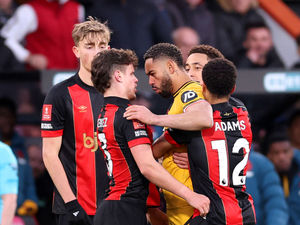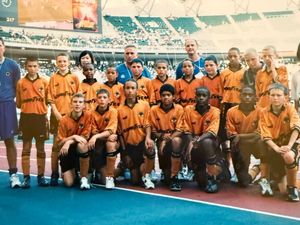Ted Farmer: Ron Flowers a powerhouse who was always driving Wolves on
Ron Flowers’ accolades tell the story – but Ted Farmer saw the magic of the man up close.
And, yes, he was every bit as good a player as his illustrious CV suggests.
Farmer rose through the ranks at Wolves during the 1950s and 60s and while he would ultimately see his career cut short by injury, he had the pleasure of playing alongside Flowers for a number of years.
The 82-year-old, who lives in Bridgnorth, fondly remembers the former midfielder as a ‘powerhouse’ and an integral part of the ‘greatest Wolves side ever’.
“I was at the club with Ron for nearly 10 years, from ‘56. He was a powerhouse of a player,” said Farmer.
“He was always pushing the team forward. He led by example, really.
“Ron was one of the great, integral parts of the greatest Wolves side ever.
“I remember playing with Ron when he was in the forces.
“He was doing his national service and had to come backwards and forwards to the Wolves for training.
“I remember playing with him in a third team match in the Birmingham League, too, at Banbury.
“He was coming back from injury and they put him in the third team. That was the first time I met him and after that, I went through the teams and met him quite regularly.
“It was great to play with him. In the dressing room, he was another person, but on the pitch he was a real powerhouse.
“He was always nagging at the other defence and pushing our players forward. That’s why I call him a powerhouse.
“As a player, he was just an integral part of one of the great Wolves sides.”
'He was a God!' Steve Bull and John Richards pay tribute to Wolves legend Ron Flowers MBE - VIDEO
Farmer joined Wolves as a schoolboy, idolising Flowers and the rest of the ‘superstars’ under Stan Cullis before going on to make a first-team impact himself.
His playing days were brought to a premature end but he still kept in contact with Flowers afterwards.
Flowers, after leaving Wolves in 1967, would go onto hold player-manager roles at both Northampton and Wellington Town/Telford United.
With the latter, he reached two FA Trophy finals at Wembley – losing to Macclesfield in 1970 before beating Hillingdon Borough the next year.
Farmer was invited down to the capital by Flowers as a guest for the first one and their wives became friends, too.
“After Ron finished, he went to Northampton as a player-manager,” said Farmer.
“One of the biggest things I remember, too, was when he was at Telford with Jim Murray.
“They got to the FA Trophy final at Wembley, and Ron invited me and my family down there.
“Even though they lost the match, we had a great time with them after the match.
“On the field he was a powerhouse, and off it he was a very nice, kind gentleman. He was a very unassuming man.”
Going back to playing alongside him, Farmer recalled how when he crossed the white line and the whistle was blown, Flowers would bring the best out of everyone around him.
He was a leader who would often help Wolves out of the mire with his determination.
Back in the changing room, though, you would not find him tearing into his team-mates.
Flowers did his talking through his actions and off the field, you could hardly wish to meet a nicer man.
“He just led by example, although you wouldn’t have thought of him as a powerhouse off the pitch,” added Farmer.
“He was a gentle, kind man. You wouldn’t find him shouting or balling about the match afterwards.
“We got friendly, my wife and I, with his wife, Yvonne. We had parties at his house, so we give our regards to all the family at this difficult time. A powerhouse of a player and an unassuming man. Ron will be greatly missed.”





